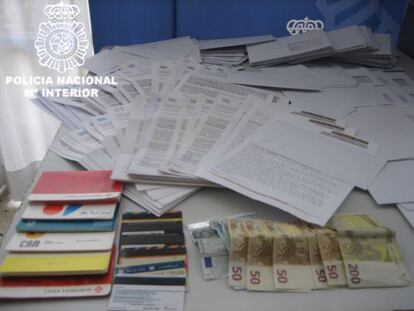Prince Nwambu and the mail scam that swindled €8.8 million from 15 victims
Spanish High Court hands down jail terms of up to 21 years to perpetrators of elaborate fraud


It’s one of the oldest tricks in the book, just with a 21st-century twist: dangle the prospect of a large sum of money for doing nothing, and somebody will take the bait. Spain’s High Court has just sentenced 14 people who participated in an elaborate Nigerian mail scam to jail terms of up to 21 years. The fraud was simple, and consisted of sending out hundreds of thousands of emails and letters telling recipients that they had just won a multi-million dollar inheritance or lottery win. All that was required was some cash up front to transfer the funds…
Between 2005 and October 2010, when arrests were made, the gang swindled €8.8 million out of just 15 people, from a total of six countries. Led by Prince Eneka Nwambu, it persuaded one victim, a Norwegian named only as Odd K.V., to make 18 transfers worth €1.86 million to accounts in the United Kingdom in return for a bogus €14 million inheritance. US citizen Howard Alfred S. paid out €3.8 million, borrowing some of it from friends, in the belief that he was to receive €580 million in return for consultancy work for the National Oil Corporation of Nigeria.
The overwhelming majority of the hundreds of thousands of messages sent out by the gang were immediately consigned to recipients’ trash folders. But all that was required was to capture the imagination of a tiny percentage of potential victims. Unlike other Nigerian fraud scams, which are typically run on a shoestring, Prince Nwambu’s gang was significantly more sophisticated.
After establishing contact with victims, the gang met them in Spain, where the transfer would allegedly take place. Its contact here was Pablo de la Mata, who worked at a branch of Deutsche Bank in Madrid. The bank has subsequently said that it had no knowledge of the fraud, and would not respond to requests to contribute toward compensating victims, despite the fact that some met with De la Mata in his branch.
Each step along the supposed path to receiving the final transfer required victims to stump up cash. Each gang member played a different role in the scam: one pretended to be the owner of the security company guarding a lottery ticket; another claimed to be a representative of the Finance Ministry, able to help cut through red tape tying up an inheritance. Others were tasked with maintaining contact with victims, writing letters, opening bank accounts, withdrawing money paid in by their targets, renting hire cars or meeting rooms, and falsifying documents.
The gang even went as far as to show its potential victims large amounts of fake cash on their arrival in Spain. And throughout the process, Prince Nwambu, using different identities, played the role of trusted friend. He now faces 21 years and two months in jail for conspiracy, aggravated fraud, money laundering and using a false identity.







































